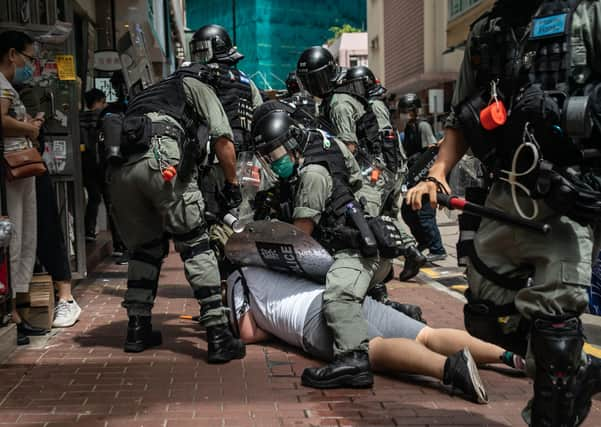Former UK consulate worker in charge of Scottish investment wins asylum


Simon Cheng, who alleges he was detained and tortured in China last year, said he hoped his successful application encouraged other democracy activists from the semi-autonomous Chinese territory to seek protection in the UK as Beijing clamps down on the city’s protest movement.
Mr Cheng, 29, also said while he was relieved asylum was granted, he remained worried “they will take my family members as hostage and send more agents to crush down the pro-democracy cause and activities outside of Hong Kong”.
Advertisement
Hide AdAdvertisement
Hide AdBeijing imposed a sweeping national security law on the city this week, bypassing Hong Kong’s legislature in a move that has been condemned by the US, the European Union and Britain, among others.
Critics say the law effectively ends the “one country, two systems” framework that guaranteed the territory a high level of autonomy and civil liberties when it reverted from British to Chinese rule 23 years ago.
Mr Cheng, who was a trade and investment officer at the British consulate tasked with attracting Chinese investment in Scotland, said he joined massive anti-government protests in the city last year to collect information for the consulate.
He went missing on 8 August after being detained while returning to Hong Kong from a business trip to Shenzhen, a mainland Chinese city just across the border.
Mr Cheng has said he was hooded, beaten and deprived of sleep during 15 days of detention as agents sought information on protesters.
He said he was also questioned about Britain’s alleged role in supporting the demonstrations.
China has not directly addressed Mr Cheng’s allegations, but the Foreign Ministry has dismissed protests from the British government over the affair as “so-called concerns or complaints”.
The ministry has cited a statement by Shenzhen police issued in August saying Mr Cheng’s legal rights had been protected and that he had “admitted his offence completely” – an apparent reference to a confession of soliciting prostitution.
Advertisement
Hide AdAdvertisement
Hide AdMr Cheng said he confessed to the offence of soliciting prostitution to avoid harsher treatment.
He said he applied for asylum in Britain late last year and received it on Tuesday.
Several other asylum cases involving people from Hong Kong are pending.
Nathan Law, a leading member of Hong Kong’s opposition movement, posted on Facebook that he had left Hong Kong for an undisclosed location out of concern for his personal safety and that of others.
Britain announced Wednesday that amid widespread concern about the security law and Hong Kong’s future, the UK would extend residency rights for Hong Kongers eligible for British National Overseas passports.
The passports were introduced in the 1980s under colonial rule. British officials estimate some 2.9 million people are eligible. But those born after 1997 cannot apply, leaving out many young student activists at the core of the pro-democracy movement.
China condemned the British move, saying that holders of the BNO passports are Chinese citizens and arguing the UK had violated a commitment it had made not to grant them the right to stay in Britain.
Comments
Want to join the conversation? Please or to comment on this article.